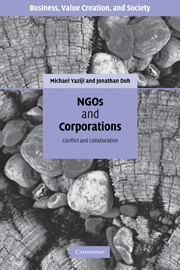Preface
Published online by Cambridge University Press: 13 January 2010
Summary
Nonprofit nongovernmental organizations (NGOs) have become important actors in the global political, social, economic and business environment. NGOs – such as Amnesty International, CARE, Greenpeace, Oxfam, Save the Children, World Wide Fund for Nature and hundreds of others – engineer campaigns with the goal of advancing specific causes. Many of these same groups provide goods and services to ameliorate intractable social and environmental problems. Recent statistics indicate a 400 percent increase in the number of international NGOs. Through their advocacy and service delivery, social purpose NGOs work on multiple issues including combating hunger, curtailing human rights abuses, countering environmental degradation and improving health care.
Increasingly, corporations encounter NGOs as the scope of activities among governments, businesses and nonprofits converge. This is reflected, for example, in the twenty-fold increase in citations of “NGOs” or “nongovernmental organizations” in the Wall Street Journal and the Financial Times in the last ten years.
In some instances, the relationship between NGOs and corporations is antagonistic. NGOs, through campaigns targeting corporations, are not only pushing firms to meet existing social expectations and legal requirements, but also seeking to change broader expectations about corporate responsibility and government regulation. By undermining the firm's legitimacy with key stakeholders, NGOs can erode a firm's market value, destroy its brand, destabilize employee morale, constrain its influence with various constituencies and limit its scope for strategic action.
- Type
- Chapter
- Information
- NGOs and CorporationsConflict and Collaboration, pp. xiii - xviPublisher: Cambridge University PressPrint publication year: 2009
- 1
- Cited by

